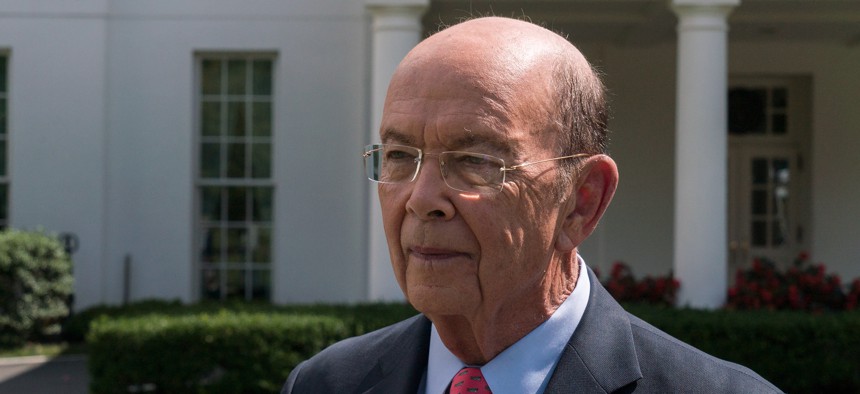
Wilbur Ross wrote that he "I considered all facts and data relevant to the question" before making a recommendation. Evan Walker/White House
Census To Add Citizenship Question to 2020 Questionnaire
Commerce memo says the question "will permit more effective enforcement" of the Voting Rights Act.
The Commerce Department announced Monday that it will add a question about the citizenship of the respondent to the 2020 questionnaire. The change, according to a department statement, follows a request by the Department of Justice.
A memo from Wilbur Ross directing the Census Bureau to add the question cites several reasons as to why the question should be added, with Ross writing that it will help "the goal of obtaining complete and accurate data."
Ross noted in his memo that the citizenship question is not a new one in the history of the decennial censuses or even of current censuses in other nations. Ross wrote that "surveys of the entire United States population consistently asked citizenship questions up until 1950" and noted that "United Nations recommends that its member countries ask census questions identifying both an individual's country of birth and the country of citizenship."
The memo laid out four options for a better 2020 questionnaire:
- Option A: Status quo of no citizenship question.
- Option B: Adding a citizenship question to the decennial census. Critics have have suggested the question would negatively impact the response rate for non-citizens.
- Option C: Instead of adding a citizenship question, using administrative records to help determine citizenship and demographic numbers.
- Option D: A combination of options B and C.
Ross said the department ultimately decided on the fourth option, saying that "the Census Bureau would use the two years remaining until the 2020 decennial census to further enhance its administrative record data sets, protocols, and statistical models to provide more complete and accurate data."
Ross also wrote that "the Census Bureau is working to obtain as many additional federal and state administrative records as possible to provide more comprehensive information for the population" to buttress the questionnaire data.
House Democratic leader Nancy Pelosi said that adding the question could "inject fear and distrust into vulnerable communities and cause traditionally undercounted communities to be even further underrepresented."
Ross said the department studied the issue and wrote that "The citizenship data provided to DOJ will be more accurate with the question" and that the data will be "of greater importance than any adverse effect that may result from people violating their legal duty to respond."
According to the Associated Press, California Attorney General Xavier Bercerra said Monday that the state will sue the administration over the change.
"We're prepared to do what we must to protect California from a deficient census," he said. "Including a citizenship question on the 2020 census is not just a bad idea — it is illegal."
New York Democrat Rep. Carolyn Maloney criticized the move on Twitter, saying the announcement has "deliberately compromised the integrity" of the count."
By adding a citizenship question to the #2020Census, @SecretaryRoss has succumbed to the hateful, nativist views that are the hallmark of this administration & deliberately compromised the integrity of the #Census for political purposes. https://t.co/fVMRJYtiqK
— Carolyn B. Maloney (@RepMaloney) March 27, 2018
The U.S. Census is one of the government operations specifically mandated by the Constitution, with Article I, Section 2 calling for an "enumeration" being made every 10 years. It is used in part to appropriate Congressional representation and the data can be used for services. In accordance with Title 13 of the U.S. Code, the Commerce Department chief "is authorized to obtain such other census information as necessary." People can be fined up to $100 for not responding to the Census questionnaire, though a cached version of a Census FAQ notes that the "Census Bureau is not a prosecuting agency. Failure to provide information is not likely to result in a fine."
Read the full Ross memo:







